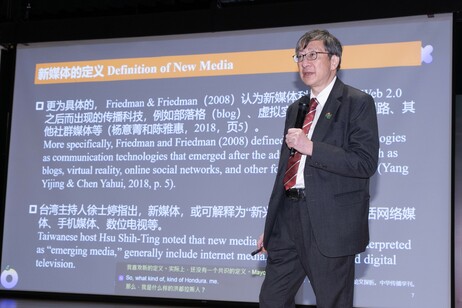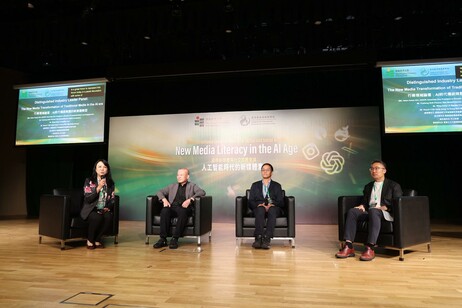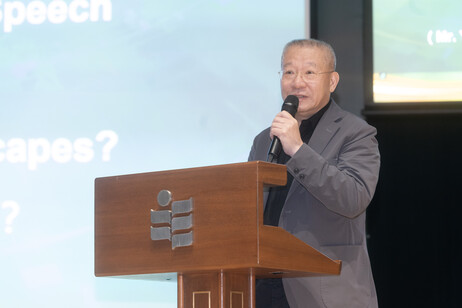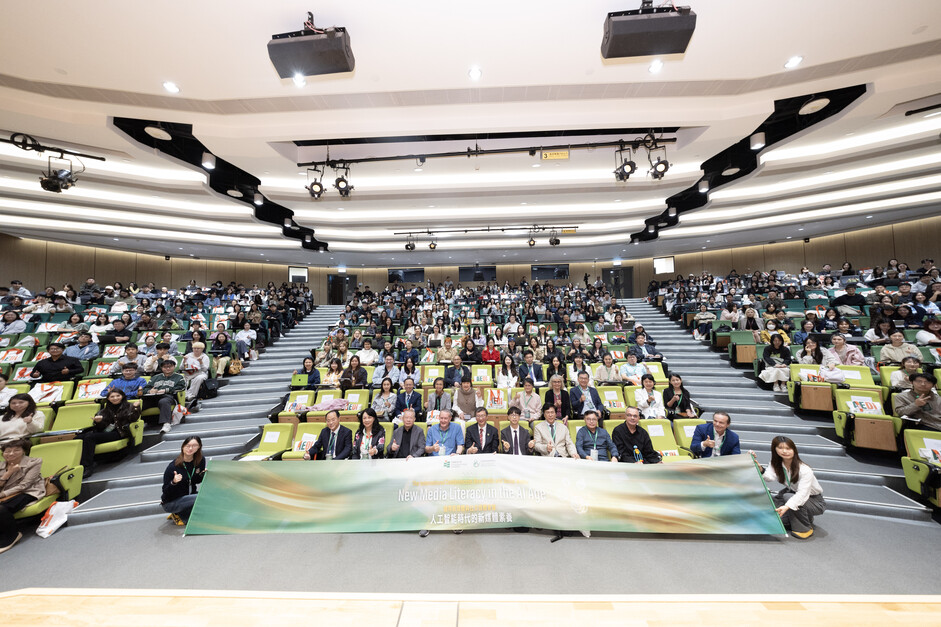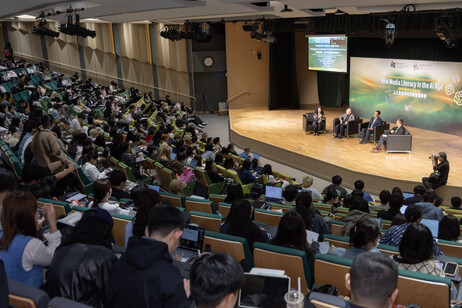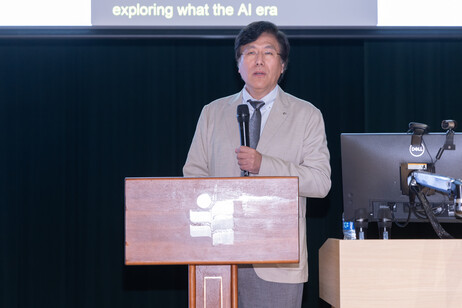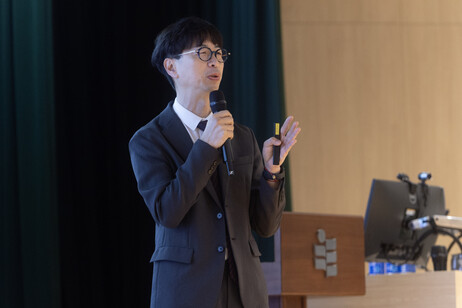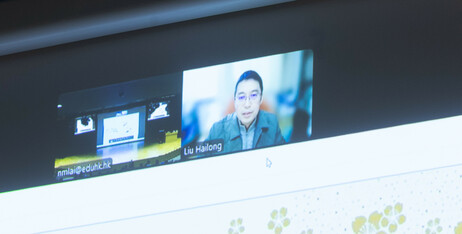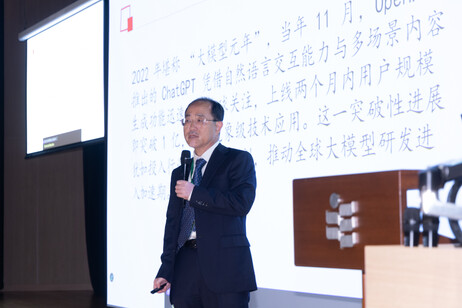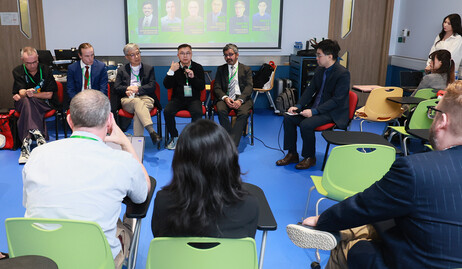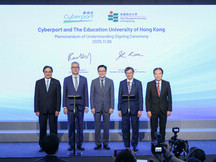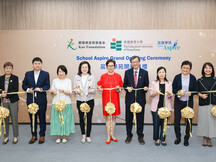EdUHK Hosts the International Conference on New Media Literacy in the AI Age
With the rapid advancement of artificial intelligence, big data, algorithms and large language models, new media skills have become essential competencies in today’s digital age. On 4 and 5 November, The Education University of Hong Kong (EdUHK) hosted the “International Conference on New Media and Social Media: New Media Literacy in The AI Age” on its Tai Po Campus. The event gathered many leading scholars, industry leaders, and researchers from around the globe to explore how new media literacy can be cultivated in an era where AI is reshaping the information ecosystem, media development and educational practices.
In his opening ceremony and keynote speech, EdUHK President and Director of AEDI, Professor John Lee Chi-Kin, noted the need for a dynamic transformation of media literacy in the age of AI. He emphasised that new media skills have become a core competency for future-ready talent, and announced that EdUHK will establish a new global institute for new media, arts and education to advance research and practice in this field. “EdUHK has always been committed to promoting educational innovation and whole-person development,” he said. “Through our AEDI, we are firmly dedicated to equipping future educators and the public with new media literacy.”
In addition to the opening ceremony, the conference featured a series of keynote speeches covering topics such as the ethical implications of AI, intelligent communications, the development of smart media, AI-driven film production, the role of digital media in youth and family contexts, and the evolving nature of media education. Ten internationally renowned scholars delivered keynote presentations, covering the following topics (listed alphabetically by surname):
- Professor Cui Baoguo, Tsinghua University – Innovation of Film and Television Content in the Era of Artificial Intelligence
- Professor Jeroen De Kloet, Professor at the Department of Media Studies, University of Amsterdam – AIya [哎呀]! On AI, Anxiety, Redundancy, and the Return of the Personal
- Professor Anthony Fung, The Chinese University of Hong Kong – AI and the Crisis in Communication Discipline
- Professor Liu Hailong, Renmin University of China – What is Intelligent Communication: the Concept and Types of Agency
- Professor Jörg Matthes, University of Vienna - Smart Machines, Healthy Minds: Building Resilience in the Generative AI Era
- Professor John Potter, University College London – Children’s Perspectives on ‘The Digital Good’: Theorising Emergent ‘AI Literacy’
- Professor Shyam Sundar, The Pennsylvania State University – Human vs. Machine Agency in the Age of Generative AI
- Professor Yang Guobin, University of Pennsylvania – Narrative Imagination and Postcritical AI Literacies
- Professor Mike Yao, University of Illinois Urbana-Champaign – Conversation as the Core: Recontextualizing Human–AI Communication in Education and Professional Training
- Professor Zhao Zizhong, Communication University of China - Development of AI and Media Intelligence
Beyond academic exchange, the conference featured an industry keynote speech by Mr Sun Yusheng, Executive Director, Deputy Chief Executive Officer and Editor-in-Chief of Phoenix Media Investment and Chief Executive Officer of Phoenix New Media, who spoke on the topic ‘Can AI Transform the Current Landscape of Communication?’ (AI 能改變當下的傳播形態和格局嗎?). This was followed by a distinguished industry leader’s panel titled “The new media transformation of traditional media in the AI era”, moderated by Ms Helen Gai Huixia, Associate Vice President (Mainland Collaboration and Development) and Director of Communications and Engagement at EdUHK. The forum included Mr Sun Yusheng, Mr Lo Wing-hung, Publisher and Chief Curator of Bastille Post, and Mr Yan Xiuyan, Head of the All-Media Center of Hong Kong Ta Kung Wen Wei Media Group, who discussed the practical applications and challenges of AI in media, and the importance of AI literacy for future career development, fostering meaningful dialogue between academia and industry.
Parallel panel sessions delved into specialised research areas, including:
- The impact of AI in Education and Communication Practices
- Youth and Family in the AI Era
- Political Discourse and Diplomacy in the Age of AI
- Inequality and Risks in Human–AI Interaction
- Digital Narratives and Storytelling in the AI Era
The conference concluded with the presentation of the ‘Best Faculty and Student Paper Awards’, in recognition of outstanding achievement in academic research. The event received strong support by prominent organisations and leading corporate partners, reinforcing EdUHK’s leadership in integrating communication, education, and AI-driven innovation.
In addition, AEDI has launched a new self-funded postgraduate programme: the Master of Arts in New Media and Social Media. This programme integrates communication theory and media studies with a focus on emerging technologies such as generative AI, equipping students to apply media knowledge and skills to real-world contexts. It aims to develop students’ media awareness and practical skills, enhance communication strategies, and foster inclusive environments to meet diverse educational needs in Hong Kong, the Chinese Mainland, and beyond.
For more details, please visit: https://aedi.eduhk.hk/zht/programmes/postgraduate-programmes/master-of-arts-in-new-media-and-social-media
—Ends—
EdUHK Hosts the International Conference on New Media Literacy in the AI Age
Download all images